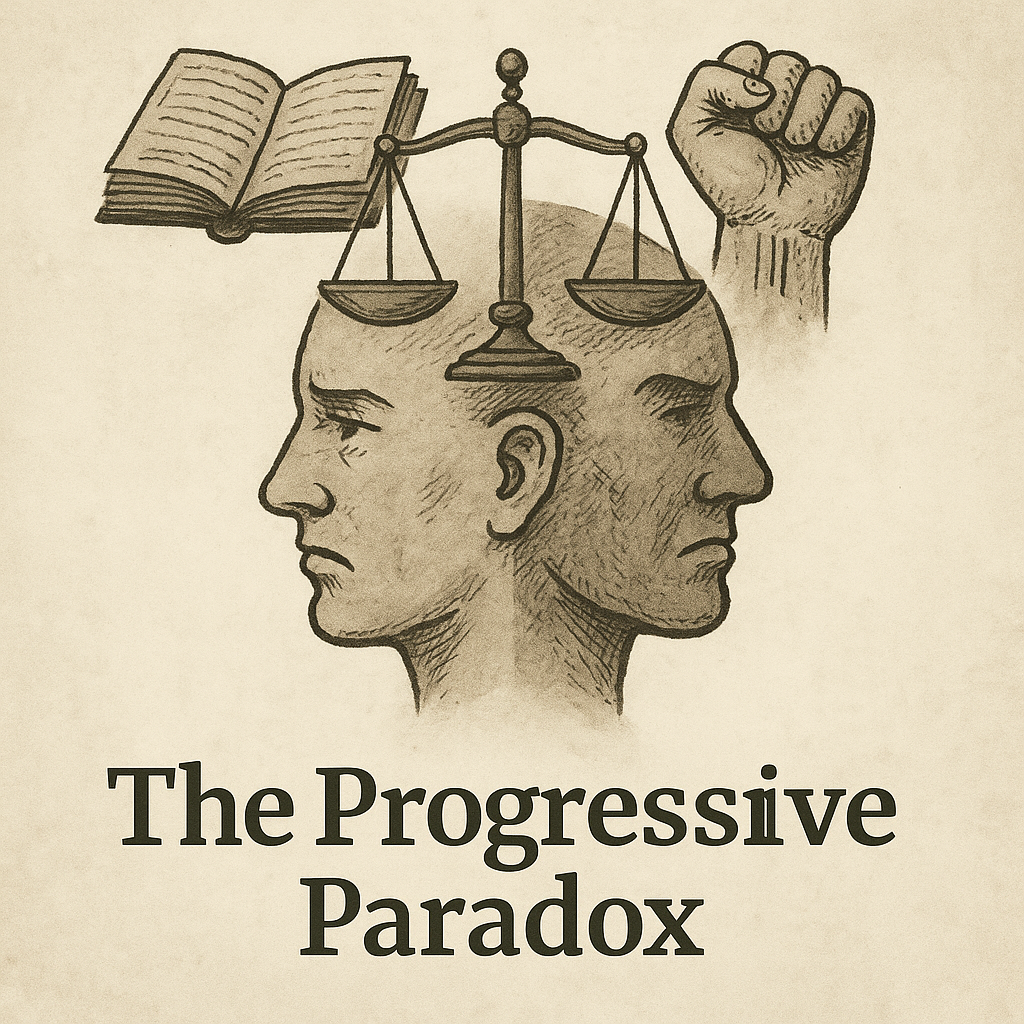The anti-woke sentiment is often not against compassion, diversity, or fairness.
It’s against what feels like moral coercion dressed as inclusion.
We all want to be on the right side of history.
We all want to make things better.
Progressivism, in its broadest sense, is the belief that the world can be improved that injustice isn’t inevitable, that suffering isn’t fixed, that through collective effort and moral clarity, we can shape something better than what came before.
It’s a beautiful idea. But it’s also a dangerous one.
The paradox is this: the more certain we become of our righteousness, the more blind we can become to what we might destroy. The very force that drives us to change the world can prevent us from seeing ourselves clearly.
The Progressive Paradox is this: a movement built on openness, compassion, and pluralism can become rigid, punitive, and closed. In seeking to correct injustice, it risks replicating it just in a different tone, under a different banner.
The very values that progressives claim to defend humility, inclusion, self-critique can be quietly abandoned once a group believes it moves from the minority into the mainstream. What begins as a refusal to accept cruelty and injustice becomes a refusal to accept disagreement. And the line between conviction and control begins to blur.
You set out to challenge power and find you’ve become it.
The Shape of the Paradox
Progressive ideals begin with empathy, with a refusal to accept cruelty and injustice as normal.
As a movement grows, it gains definition. As it gains followers, it needs boundaries. Eventually, what began as a response to suffering and injustice becomes a system of its own with insiders and outsiders, accepted language, sacred principles, and unthinkable heresies. (Progressive movements are nothing new they have always existed)
It becomes its own orthodoxy.
And here’s the problem: when your identity is built on being right, then anyone who questions you must be wrong. Not just mistaken but immoral. Dangerous. An obstacle to progress.
In this way, progressivism can reproduce the very thing it tries to replace: dogma, exclusion, and punishment. The mechanisms of power may shift hands but the shape of that power remains.
You can be radical and still be rigid.
You can be compassionate and still be judgemental.
You can be pluralistic and still absolutist.
The Illusion of Arrival
Every generation believes it has arrived at the truth. That its moral clarity is final. That the battle is now between those who get it and those who must be overcome.
But history tells another story.
The people who once believed they were “on the right side” have often been the ones who committed the worst acts, not in spite of their beliefs, but because of them. Not out of hatred, but out of moral certainty.
That’s the risk when you tie your sense of goodness to being right: you become deaf to correction.
Progress becomes a kind of momentum (or religion), not guided by reflection and reason, but driven by belief and social pressure.
Humility Is Not Compromise
This doesn’t mean we should give up on justice.
It doesn’t mean we should stay quiet in the face of cruelty.
It doesn’t mean “both sides” are always equal.
It does not mean progressives are wrong (far from it most of the time).
But it does mean we must hold even our best ideas with care.
We must act, but not assume our vision is final.
We must listen, not just to the oppressed but to the people who make us uncomfortable.
We must, always, remain open to the possibility that we might be wrong.
That’s not weakness. It’s discipline.
The French Revolution: A Cautionary Tale
In 1789, the people of France rose up against a corrupt and unequal system. They demanded freedom, justice, and human dignity. They believed, with full sincerity, that they were building a better world.
They abolished the monarchy. They rewrote the calendar. They declared the rights of man.
And then, they started executing one another.
The same people who called for liberty sent their neighbours to the guillotine. The same revolutionaries who fought for justice created a new regime of terror. Robespierre, who famously declared that “virtue without terror is powerless,” was eventually executed himself.
It was not a failure of idealism. It was idealism without humility.
Absolute moral certainity became moral violence.
And this is not unique. It is a pattern.
Holding the Tension
Progress is possible and absolutely necessary. Change matters. But history reminds us that every revolution must first pass through the mirror.
If we do not question our assumptions, we become their servants.
If we do not ground our ideals in self-awareness, they will harden into ideology.
The paradox will always be there: to make the world better, we must begin with ourselves. (Credit Ghandi).
And to do that well, we must act with courage and caution, conviction and humility.
To serve an ideal without reflection is to risk becoming what you once opposed. When ideology owns us, humanity becomes collateral.
Because being on the right side of history is not something we get to claim.
It’s something others will judge long after we’re gone.
The task is not just to be right.
It is to do good and to stay human while doing it.
Good > Progress

